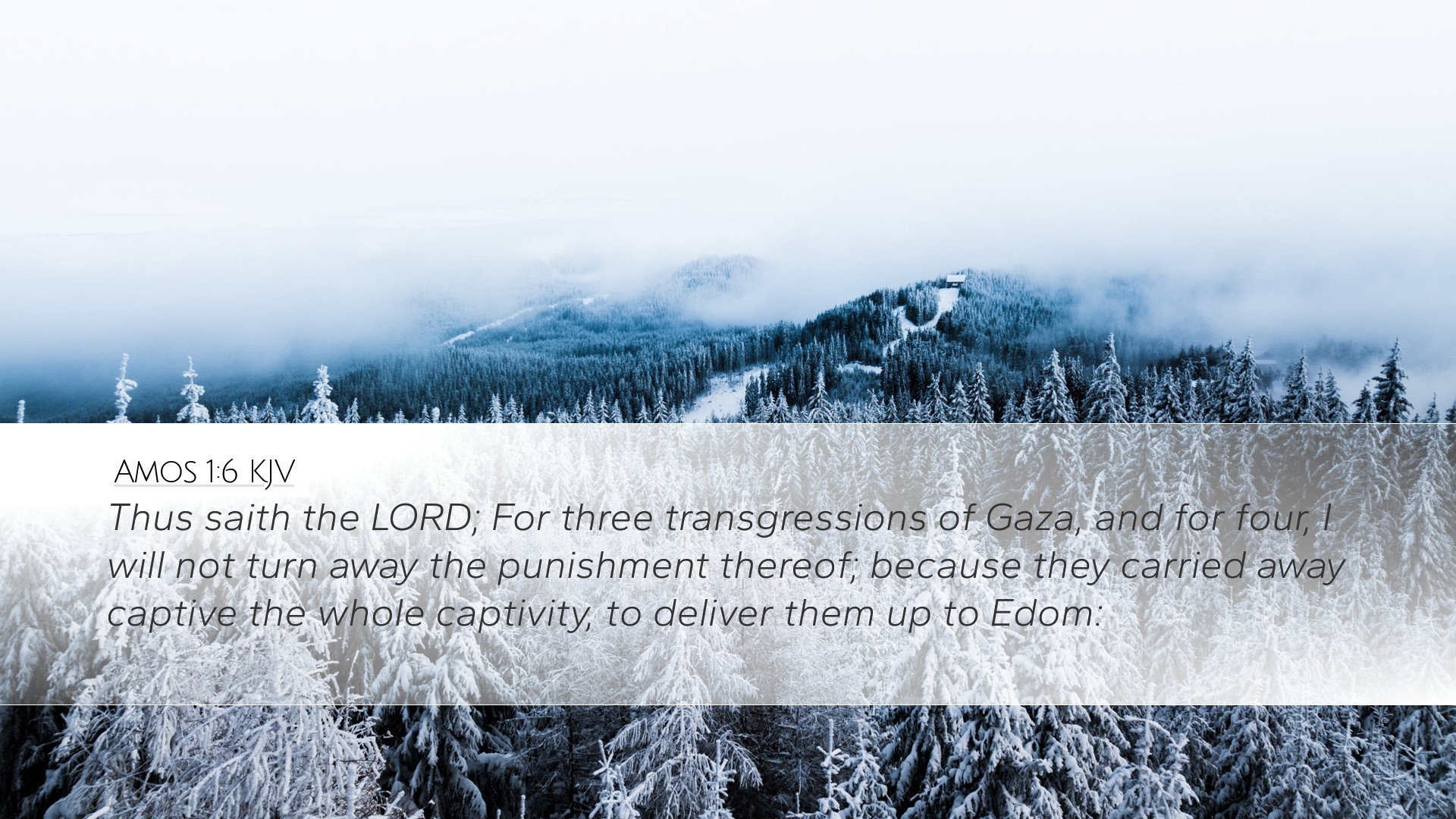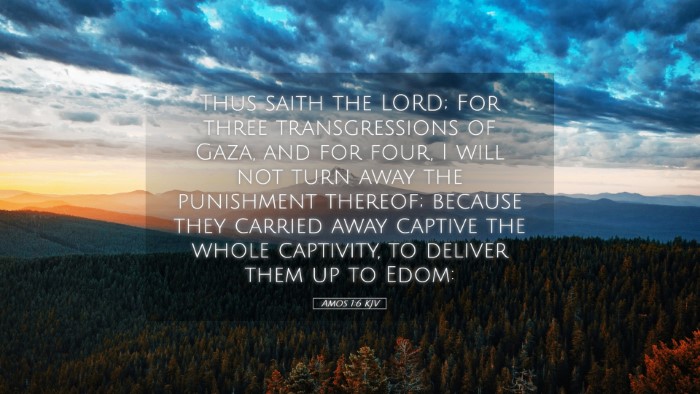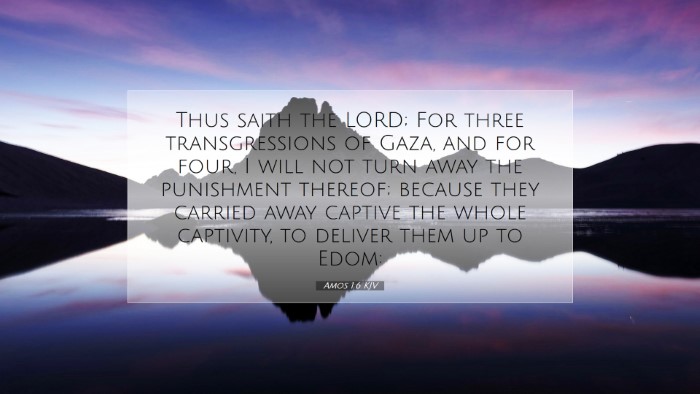Old Testament
Genesis Exodus Leviticus Numbers Deuteronomy Joshua Judges Ruth 1 Samuel 2 Samuel 1 Kings 2 Kings 1 Chronicles 2 Chronicles Ezra Nehemiah Esther Job Psalms Proverbs Ecclesiastes Song of Solomon Isaiah Jeremiah Lamentations Ezekiel Daniel Hosea Joel Amos Obadiah Jonah Micah Nahum Habakkuk Zephaniah Haggai Zechariah MalachiAmos 1:6
Amos 1:6 KJV
Thus saith the LORD; For three transgressions of Gaza, and for four, I will not turn away the punishment thereof; because they carried away captive the whole captivity, to deliver them up to Edom:
Amos 1:6 Bible Commentary
Commentary on Amos 1:6
The verse, Amos 1:6, states:
"Thus says the Lord: For three transgressions of Gaza, and for four, I will not turn away its punishment, because they took captive the whole captivity to deliver them up to Edom."
Introduction
The commentary on Amos 1:6 requires an exploration of the historical context, theological implications, and moral teachings present in this brief yet profound statement. Each of the public domain commentaries offers rich insights into the meaning and implications of this prophecy. Below is a summarized commentary derived from the works of Matthew Henry, Albert Barnes, and Adam Clarke.
Historical Context
Amos was a prophet during a time of prosperity in Israel, yet he saw deep social injustices and moral corruption. This verse specifically addresses Gaza, a significant city of the Philistines, illustrating God's judgment on nations surrounding Israel for their transgressions.
- Gaza's Role: Gaza was one of the principal cities of the Philistines and was known for its trading power and military strength.
- Captivity: The phrase "took captive the whole captivity" points towards the practice of slavery and oppression, where the Philistines exploited their captives.
- Edom's Involvement: Edom's role indicates collaboration against Israel, highlighting the animosity and political intrigues of the era.
Theological Themes
Amos 1:6 can be approached through several theological themes that reveal God’s character and His dealings with nations.
- Divine Justice: The phrase "I will not turn away its punishment" emphasizes God's unwavering commitment to justice. The specificity of their sins—aided by their actions against Israel—demonstrates that God does not overlook evil among nations.
- Accountability: The repeated phrase “For three transgressions, and for four” indicates a complete measure of transgressions leading to inevitable judgment. It symbolizes the fullness of sin that brings nations to judgment.
- God as Sovereign: God speaks through Amos to assert His sovereignty over all nations, not just Israel. The sins of Gaza make it clear that God's covenant extends beyond ethnic boundaries and includes moral expectations for all peoples.
Analysis of Key Phrases
Examining the key phrases in this verse may provide a deeper understanding of its implications:
- "For three transgressions of Gaza, and for four": This literary device signifies the cumulative weight of sin, suggesting not just isolated incidents but a pattern of pervasive iniquity.
- "I will not turn away its punishment": This indicates God's active response to sin; it is not passive indifference. Punishment is a form of divine retribution that upholds moral order.
Moral and Ethical Considerations
For contemporary pastors, theologians, and students of Scripture, this verse serves as a powerful reminder of the need for moral integrity and justice in all dealings, both personal and communal.
- Call for Justice: This passage implores believers to reflect on issues of justice in society. It highlights the consequences of exploitation and oppression and the need for advocacy on behalf of the oppressed.
- God’s Judgment: The truth that God holds all nations accountable serves as a warning against complacency in the face of injustice. It challenges individuals and communities to engage actively in rectifying wrongs.
Insights from Matthew Henry
Matthew Henry, known for his thoroughness, emphasizes the extent of Gaza’s guilt, particularly regarding their treatment of captured peoples. He notes that their sins cry out for justice, and as such, their punishment is deserved.
He also highlights that God's judgments are often delayed but are always certain, which serves as both a comfort to the oppressed and a warning to the oppressors.
Insights from Albert Barnes
Albert Barnes elaborates on the implications of captivity and the moral crimes associated with it. He suggests that this verse should instill a sober view of God's righteousness and the finality of His justice.
Barnes also connects this passage to the broader narrative of God's divine retribution against all nations, reinforcing the concept that no one is exempt from God's moral authority.
Insights from Adam Clarke
Adam Clarke reflects on the nature of the judgments pronounced in this verse, suggesting that they point to the eventual fate of all who practice unrighteousness and cruelty. He discusses the significance of Edom's involvement, noting that such alliances against Israel symbolize broader spiritual struggles.
Clarke emphasizes that the prophetic word serves as a deliverance from divine wrath for the faithful, serving both as a warning to the wicked and as a promise to the righteous.
Conclusion
Amos 1:6 is not simply a historical pronouncement; it stands as a timeless reminder of God's justice and moral expectations placed upon all nations. As modern readers and scholars, paying attention to this verse can inspire righteous action against injustice and a deeper introspection of our collective and personal responsibilities in the light of divine scrutiny.
In conclusion, the insights gleaned from the commentaries collectively serve to reinforce the understanding that God's judgment is serious and non-discriminatory, urging a response towards justice that reflects His nature.


